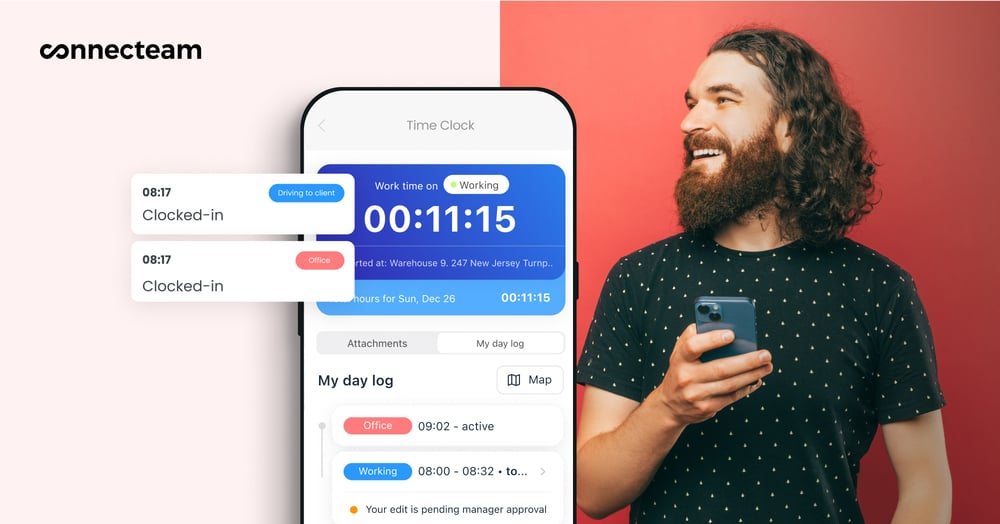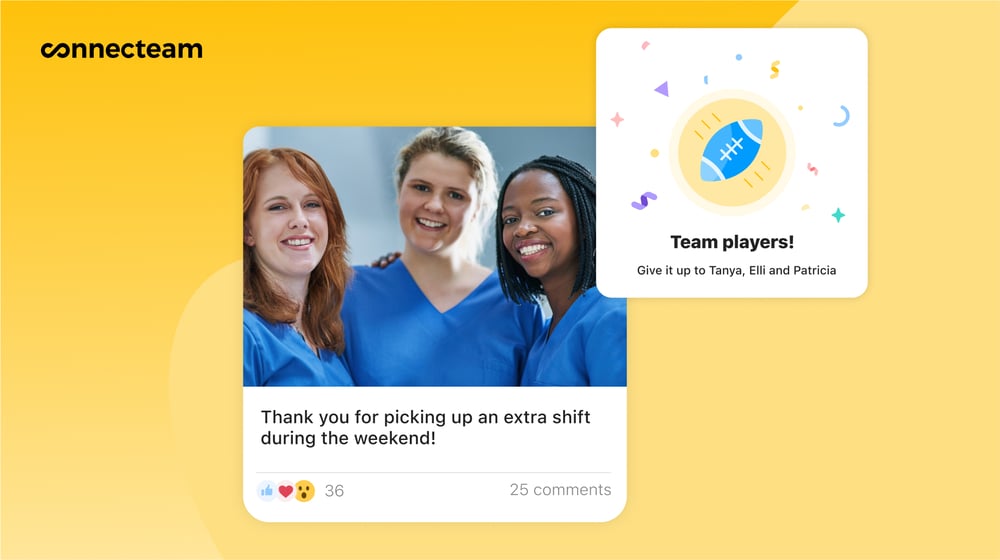Tackling worker tardiness requires a fine balance between enforcing rules and showing empathy. Here are 12 ways to address the situation.
Chronic employee lateness can disrupt work, erode company culture, and damage your reputation with customers. But addressing it can be tricky, especially with high-performers or those with sensitive personal problems.
Below, we share 12 simple but effective ways for you to handle employees who are always late to work so you can keep things running smoothly.
Key Takeaways
- Tardy employees can put your company’s operations, team morale, and reputation at risk.
- Prevent lateness by setting clear time and attendance policies, using time tracking solutions like Connecteam, linking punctuality to performance, and leading by example.
- Host meetings and socials before shifts, offer public transport subsidies, and reward employees for timeliness to encourage workers to show up on time.
- If you’re still seeing tardiness, consider addressing underlying issues in a one-to-one chat or offering flexible work schedules to support your employees.
1. Set Clear Time and Attendance Policies
Firstly, you need to create a company time and attendance policy. In addition to covering work hours and time off rules, it should clearly indicate expected arrival times so there’s no confusion or misunderstanding. This could be a particular hour of the day for all employees—for instance, 9am. Or by shift, such as 7am for morning and 4pm for evening shifts.
Some employees work on ad hoc tasks and projects with different start times each day. In this case, your policy could say something like, “Employees need to arrive at their job location 5 minutes before their shift time.”
You can also consider including a small grace period for arriving at work—for instance, letting workers arrive up to 15 minutes late without consequences. This allows employees to carry on with their day without feeling penalized for occasional lateness. That said, you should specify how often this type of lateness will be accepted so employees don’t take advantage of it.
Once you’ve drafted your policy, include it in your employee handbook so workers know where to find it. Additionally, review the rules with new hires during onboarding and orientation so they’re clear on the company’s practices from day one. You can also use emails, meetings, or bulletin boards to periodically remind employees of the rules. This helps with employees showing up to work on time.
Did You Know?
Connecteam’s company knowledge base is a great place to store company policies. Employees can access and review these from anywhere using their smartphones.
2. Have Consistent Guidelines for Exceptions
Business owners often make exceptions for employees who are late due to emergencies, health issues, or other personal problems. But if you’re going to be lenient with one worker, you can’t discipline someone else in the same situation.
That’s why it’s important to set clear and consistent guidelines for handling exceptions. This can help educate managers on what circumstances—for example, sickness, childcare issues, train or bus delays, etc.—are excusable and how often.
Further, you can draft guidelines asking workers to contact their supervisor or HR a certain amount of time—e.g., 30 minutes—before their shift if they’re running late. This not only ensures fairness and transparency but also gives you the time to make adjustments, such as shift swaps, if necessary.
Did You Know?
With Connecteam’s job scheduling tools, employees running late can swap shifts with a coworker who’s more likely to arrive on time. They can do this even at the last minute from their mobile devices and with or without manager approval.
3. Use Time Tracking Software
A good time tracking system lets employees clock in and out of their shifts, accurately capturing their work dates and times. Seeing who’s late and how often can help you identify and address red flags before they snowball.
For instance, if you note that an employee has started arriving late to work more often than before, you can raise it with them before it becomes a habit and impacts their work.

This data really comes in handy when you’re thinking about how to talk to an employee about being late. For example, you can use it as evidence to openly discuss punctuality during performance reviews.
Fixing lateness is important, but you must know how to get employees to show up on time in the first place. Find a time clock app that notifies managers when employees punch into work. Some, like Connecteam, even show you staff members’ GPS locations at clock-in. Knowing this keeps the team accountable and encourages employees to be on time.
This Might Interest You
Want to know more about getting Employees to show up on time and also looking for time tracking software with built-in GPS functionality? Explore the 8 best GPS time clock solutions.
4. Make Punctuality Core to Performance
When business owners think about how to address tardiness at work, they often take a reactive rather than proactive approach. Instead of waiting to correct latecomers, consider making punctuality a key metric in your performance reviews.
You can do this by:
- Integrating punctuality metrics into performance review templates.
- Discussing attendance records openly during performance reviews.
- Setting clear expectations for improvement and tracking progress over time.
For consistently and unreasonably tardy employees, you could also implement a formal performance improvement plan (PIP) with punctuality as the core area of focus. As part of the PIP, review the employee’s current time and attendance records, establish goals, provide support and mentorship, and monitor their timeliness over a specified period to help them improve.
5. Lead by Example
When supervisors and company leaders are consistently late to work, employees are likely to follow suit. On the other hand, when leadership is always on time, it helps to increase morale and establish the right kind of work environment.
So, encourage all leaders and managers to arrive on time. Highlight this as a valued trait in their training and development programs, and recognize leaders who model punctual behavior and encourage timeliness in their teams. Where they’re falling short, intervene with a one-to-one discussion or provide coaching to help address the situation.
Similarly, take active steps to demonstrate punctuality yourself and practice what you preach yourself. For instance, set an alarm to wake up on time, stick to the company’s rules, and inform your team when you’re running late.
Pro Tip
Most ready training materials focus on job-related hard and soft skills and don’t cover punctuality. Use employee training solutions that let you build custom training modules that educate both workers and leaders about the topic.
6. Create a Welcome-To-Work Routine
Organized activities can encourage employees to show up on time, especially for workers who are late because they’re feeling demotivated or disengaged. Create a pleasant routine before shifts, which can include activities like a quick team huddle, drinking coffee together, or completing a mindfulness exercise.
Also, rotating these activities is a great way to keep things fresh and exciting for workers. For example, you might have “Mindful Mondays,” “Team-huddle Tuesdays,” “Coffee Fridays,” and different routines for other days. You can also ask employees to occasionally plan and lead these sessions. This is a great way to encourage timely arrivals.
Pro Tip
Don’t assume what makes your employees tick. Use surveys and polls to learn more about your workers’ preferences and what kind of activities will bring them into work on time.
7. Host Meetings and Socials First Thing
In addition to early routines, you can host team meetings, company town halls, and socials at the start of the day or shifts. Think breakfast meetings or lunch and learns, fitness classes, team-building workshops, and other events that create a sense of community and encourage employees to arrive early.
Did You Know?
You can use Connecteam’s company events app to plan events, share details, invite attendees, and track RSVPs.
8. Offer Public Transport Subsidies
Employees are commonly late to work because they drive to their jobs during rush hour, often getting stuck in traffic jams.
To avoid this, consider providing your employees with incentives such as subsidies and discounts for overground and underground trains, trams, or even buses, which tend to have separate bus lanes.
While public transportation is also prone to delays, it’s less of a problem than daily road traffic.
Pro Tip
Notify employees when there are transportation delays, such as road accidents and closures and public transport delays, cancellations, or strikes. You can use Connecteam’s company updates tool to broadcast announcements to your entire team so they can plan their commutes and arrive at work on time.
9. Address Underlying Issues One-To-One
Employees being late for work every day is typically rooted in deeper issues you’re unaware of.
Have one-to-one meetings with chronically late workers to investigate what’s really going on. They might be facing personal problems such as health issues, caregiving commitments, transportation challenges, or burnout that might be causing their lateness.
Identifying these issues can help you support your team through employee assistance programs, mental health days, and so on.
Did You Know?
Connecteam’s online team chat lets you engage with workers in a private, one-to-one setting. Employees can update you about their lateness, ask questions, share concerns, and even attach files such as medical reports and doctor’s notes.
10. Work Through Lateness while Respecting Privacy
While one-to-ones are great for understanding underlying issues, some employees aren’t comfortable sharing their personal problems with their employers.
It can be tricky to know how to address tardiness at work without asking workers about their problems, but it’s not impossible. Here’s how to talk to an employee about being late without prying:
- Review the employee’s time and attendance record and ask how long they’ll need flexibility with their start time.
- Once you’ve understood their timelines, set clear and achievable goals to improve their punctuality. For example, say the employee has consistently been 30 minutes late for their shift over the past couple of weeks. You might set a goal for them to arrive 10 minutes earlier while they work to address their personal problems.
- Track progress carefully and have regular one-to-one meetings to offer support.
11. Praise and Reward Timeliness
When creating tactics for how to get employees to show up on time, remember you must acknowledge both good and bad behavior. If you discipline employees who are always late at work, you should also appreciate those who are always on time.
Consider introducing a reward system for consistently punctual employees. You could give them a badge or award like “Most Punctual Employee of the Month” or a shout-out on your company social feed, encouraging others to follow suit.
Importantly, let your staff members know how they can achieve these awards so they have a concrete goal to work towards. This is a great way to prevent lateness with positive reinforcement.
Pro Tip
Take things up a notch by offering employees tangible rewards that will further motivate them to arrive at work on time. For example, Connecteam lets you give digital tokens that can be redeemed as employee reward gift cards.

12. Offer Flexible Work Schedules
You might notice that a certain employee is almost always late at work. This can be a sign of a deeper mismatch: Your company’s timings simply don’t work for the employee.
Where possible, provide your workers with flexible work schedules. For instance, you could create a flexible hours policy that allows employees to choose their start time within a given window—e.g., 7am to 10am—or pick between morning and night shifts.
If their jobs require collaboration, set core hours during which everyone must be present. Ensure team members are clear on the flexibility policy and continue tracking their hours to prevent them from abusing it.
This way, you’ll be able to accommodate employees’ personal schedules and reduce stress related to commuting issues, family problems, and more.
Did You Know?
Connecteam’s auto-scheduler assigns shifts based on workers’ location, availability, and preferences—minimizing the chances of conflict and lateness.
The Bottom Line
A tardy employee can hamper workflow, dampen team morale, and put your reputation at risk. But it’s not easy dealing with employees who are always late at work, particularly if they’re facing personal problems.
Being late for work almost always has an underlying cause, and there are steps you can take to understand and prevent it from happening.
Setting clear time and attendance policies, making punctuality a core part of performance reviews, and offering support such as flexible schedules can help employees improve. Additionally, hosting meetings and socials before the start of a shift and offering public transport incentives can encourage workers to come in earlier.
Finally, good time tracking software like Connecteam captures your team’s time and attendance data so you can spot and address any issues and track your employee’s progress over time.
Try Connecteam for free today.
FAQs
How to talk to an employee about being late when they’re dealing with health conditions
Understand your employee’s situation and show empathy. Ask how you can support them—for example, through flexible work options. Show you care about their well-being and are willing to help them manage both their health and work commitments.
How to address tardiness at work with top performers
Make sure to acknowledge their great work first. Then, explain how punctuality impacts the team and suggest ways to improve their timing. Also, let them know punctuality is key to good performance and will help them maintain their track record.
How to get employees to show up on time despite long commutes
Consider flexible start times to accommodate employees with long commutes. Alternatively, consider offering public transport incentives to prevent them from being late due to road traffic.




